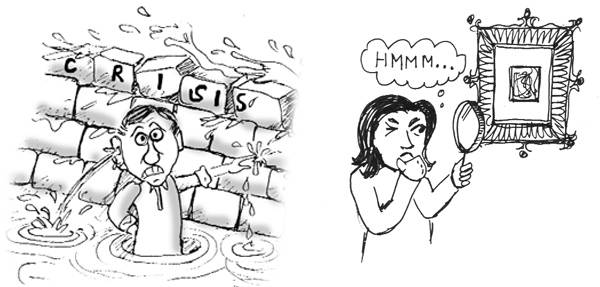
Democrazy
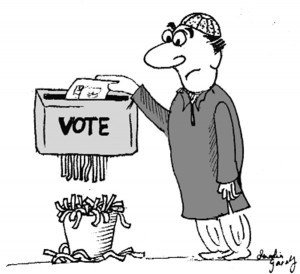
Sir,
Our 9/11 has, briefly, diverted attention from some four plus months of dancing and disruption for democracy led by the redoubtable TuQ and IK combination and their anticipatorily merry men. This has, also briefly, delayed the onset of the promised democracy which we have yet to taste.
Could someone among the elites, dancers, face painters, lovers of democracy, tax payers or evaders, religious non-bigots, please explain the following: a day or so ago, Karachi’s police force beat up a group of young doctors protesting the possible privatization of JPMC and ex-Federal hospitals orphaned after the 18th Amendment. Earlier, a group of poor, long unpaid, governmental teachers trying to approach Bilawal Terrority were similarly dispersed. In the Punjab there are regular, successful, ‘lathi charges’ on paramedics, nurses, students, even eunuchs and, quite recently a blind persons’ protest. The rights of minorities don’t even count. Were these citizens not also entitled to their “democratic right of peaceful protest,” to quote the eager leader-in-waiting?
When the near apoplectic TuQ’s spirited followers were savaged by our law enforcers the sky fell. Even as that story continues how is it that IK et al managed over four months of chaos that is painfully likely soon to recur and NOTHING happened? Not from the military; not from the Supreme Court whose railings were adorned with wet laundry; not even from the police for whom the roles were briefly reversed. And not from a totally demoralized government and a suddenly democracy loving flock of good-weather feathered friends?
A worried Mr Zardari has referred to the “tomcat” and its unseen handlers. The feathered flock’s muted dissent and swift acquiescence to military courts gives a possibly new meaning to the democratic antics of the IK/TuQ team. Would someone care to comment before dissent, even on this score, becomes impossible?
Dr Mervyn Hosein,
Karachi.
Trial and terror
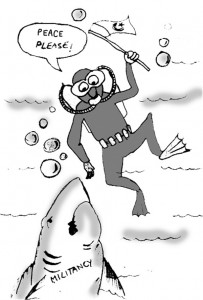
Sir,
Despotic monarchs and corrupt leaders of Muslim states have exploited religion to further their rule, deprived citizens of education, health and justice, and are today facing threat of terrorism from those very private militias that they created to achieve vested interests. We need to understand that the US is committed to its own national security, apart from their commitment to security of Israel and Europe, while dealing with other countries only to achieve these declared objectives.
The problems that Pakistan faces are created by the ruling elite and the powerful bureaucracy, both civil and uniformed, because of their conflicts of interest and the unfortunate reality that most of them have no stakes in this country. They say that there are foreign forces behind terrorism in Pakistan. For any group or country to create chaos and unrest, all they have to do is recruit young men, brainwash them and unleash their wrath upon countries where they reside. If that is happening in Pakistan, the fault lies not with the countries who exploit our weaknesses, but in us, for allowing unregulated finances to flow in and out of the country, making crime a profitable venture.
Any sensible individual can conclude that the solution lies in investing on education, regulating the curricula of schools and madrassas, as well as the sermons delivered from mosques, as is practiced in nations like Malaysia, Indonesia, even Saudi Arabia and the UAE. Instead of taking such basic measures, those in power would like to spend billions fighting terrorism and holding seminars, which would go waste unless basic structural reforms in the judiciary, education and health are enforced. No sovereign nation, with a disciplined army and regulated law enforcement agencies, would ever make private militias for outsourcing what should solely be the job of the state.
We need to understand that our outdated law of evidence should be upgraded to keep pace with modern technological advances so that DNA, phone recordings and video surveillance can be accepted as evidence for conviction by anti-terrorist courts, headed by judicial officials whose identities are never revealed, and under no circumstances should the media have any access to them. Those involved in terrorism and those who abet them must be convicted by same courts.
Exemplary punishment must be followed by structural reforms so that justice is seen to be done, jobs given on merit, and the corrupt penalized.
Rahim Khan,
Islamabad.
Perks of privatization

Sir,
There has been much debate about privatization in Pakistan over the years. Privatization in Pakistan was first conceived and implemented by then Prime Minister Nawaz Sharif in 1990. That program was envisaged to improve the growth of the national economy. But has this policy contributed towards a better future and a better economy?
In a recently published research paper by Arif Hussain, which attempts to assess the impact of privatization on employment and output in Pakistan and consist of a data set including four years before and after the measures for operating efficiency. Profitability, output, capital investment and leverage are used as measures for efficiency. That study covered a total of 44 units privatized to determine their financial and operating efficiency. The sample includes various sectors like cement, oil and gas, banks and finance, chemical, and the auto industry. The study has shown no significant improvement in operating efficiency, profitability, output, capital investment and leverage. The results revealed in the study are surprisingly unexpected and quite a setback for advocates of privatization.
In another study on the financial and operating performance of privatized firms published in the International Journal of Finance and Economics shows quite contradictory results. The study substantiates that privatization has capitulated significant increase in performance which is empirically evident through overall performance of privatized sectors. However the way privatization has taken place over the years has raised some questions but in true sense it has worked well. In essence, the effective way of privatizing state owned enterprises is to spread it over a period of time. There should be a particular predefined order for privatization. The government should offer those units for sale which are already being a burden on the country, followed by less profitable units, and finally the more profitable ones. But due to some political circumstances, this practice has not been carried out in Pakistan.
The privatization of banks in Pakistan is an exemplary illustration of what good the economy can reap if there is a broad political consensus. The turnaround of MCB and Allied bank strengthens this argument.
I would also like to allay some fears and explode the myths about privatization. The most common myth against privatization is loss of employment. This fear is largely unfounded. The example of privatization in the banking sector controverts those who make such claims. In 1997 when the restructuring, downsizing and privatization picked up speed there were 105,000 employees working in the sector. After privatization was completed, the work force had expanded to 114,000. It is true that the pattern of employment has changed and more productive and skilled workers have been taken up at the expense of low skilled or unskilled workers. But this is the essence of economic development – the shift from low productivity to high productivity by skill upgrades. The profits of the banks have risen since privatization not only due to better management but because of this shift from low-skill to high-skill manpower.
The other fear is that workers will no longer be protected, as firing them is much easier under private ownership. The process of hiring and firing of employees in a public sector company is highly convoluted, complex and cumbersome. Those found guilty of infractions or negligence of duties or even corruption can only be dispensed with after a protracted process of disciplinary proceedings that sometimes take several years to complete. In the meanwhile, the employee continues to stay put in service and receives all the emoluments and perks.
In the rare case a departmental inquiry comes up with a guilty verdict, the employee can appeal to the Federal Services Tribunal and if he is unsuccessful, then all the way to the Supreme Court. Why will any right minded boss choose to go through such an ordeal? Privatization enables the managers to distinguish between hard working and productive workers from the lazy and incompetent. The former are rewarded for their performance while the latter are the target of firing. But this is the essence of an efficient economy.
To conclude, we can say that we may find privatization of state owned enterprises strenuous and demanding for employees in general, but the shift towards a high-performing economy and a high-skill manpower requires an optimal mix of state and private enterprises, which complement each other in achieving the desired results for the country.
Maaz Bin Abdul Quddus,
Islamabad.
For art’s sake
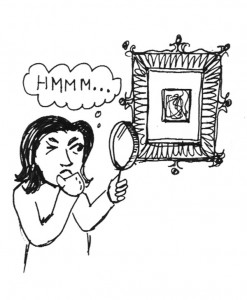
Sir,
This is in response to Ms Sara Mahmood’s review of a miniature exhibition organized by the Unicorn Gallery, titled ‘Major Miniatures’ and published in the December 5, 2014 issue of The Friday Times.
I am the founder of the gallery, and I believe the exhibition curated some of the finest works of today’s renowned miniaturists.
The writer says she saw the same works in the exhibition as she has been seeing for the last twenty years or so. But miniature artists like Asif Ahmed, Saira Wasim, Khadim Ali, Amjad Ali and a host of others had not even started to work more than five years ago.
She forgets to acknowledge Professor Bashir Ahmed’s work and participation in this show – whose three major works were also on display. Ustad Bashir Ahmed was the head of the NCA miniature department for over twenty years.
She claims that the varied theme had no curatorial framework and was like an illogical theme park. It was in effect a miniatures show and the works were carefully selected with diligence and curatorial sensibility. We commissioned works from Khadim Ali, Saira Wasim, and Ustad Bashir, which no other gallery can.
She proceeds to mention that Irfan Hassan, the artist, was perplexed and infuriated. This was denied by Irfan who is a friend and a favourite with the gallery since he began his career. In his case, because the gallery could not access a work, a work from the gallery collection was exhibited. However, this too was an exceptional diptych, which has been printed in the article.
Saira Wasim is showing for the first time.
Unicorn Gallery has been promoting and supporting Pakistani art internationally for twelve years and has taken exhibitions to India, UK, Singapore, Dubai and Bangladesh. We have hosted Art Book Fairs, published artists biographies, authored, and hosted retrospectives. We are recently hosting the late master artist Laila Shahzada’s retrospective on her twentieth death anniversary with her family.
We remain committed to the conservation, preservation of Pakistani art as we create awareness internationally and are happy to announce we have been approached by the Metropolitan Museum of Art New York to collaborate on our publications and art ventures.
Seemah Niaz,
Karachi.
How to fight terror – I
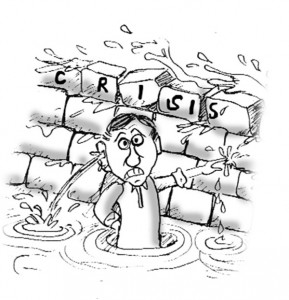
Sir,
It is time we accept the harsh reality that our existing security strategy and methodology is insufficient to efficiently contain and tackle the onslaught of terrorism unleashed by religious, sectarian, ethnic and criminal grounds. If any proof is needed, frequent attacks on sensitive security installations and civilian institutions like schools, markets, and places of worship should be enough.
Success in the war against terrorism depends on plugging the loopholes in our security created by rampant corruption within our airport, port, coastal and border checkposts, and maintaining efficient accessible computerized databases of all individuals, vehicle engine and registration numbers, cell phones, schools and seminaries, land and constructed household ownership records and criminal history of every person living in Pakistan. Unfortunately, institutionalized corruption within the bureaucracy and a lack of political will of the ruling elite will be the biggest obstacle to the development of such a database.
What Pakistan needs is a trained dedicated force specialized in forensics, computer science and counter terrorism warfare, to tackle the highly trained and committed enemy that lives within us and has been brainwashed by its handlers that this a religious war. We will have to cut off their funding and totally eliminate armament and explosives supply channels, apart from destroying their existing sanctuaries.
Pakistan has disciplined professional armed forces, trained to fight a known army, but it lacks competent civil law enforcement agencies with the technological capacity to handle insurgents using modern guerilla warfare, appropriate communication technology, or training in forensic detection.
NACTA must have a dedicated independent skilled workforce like Homeland Security, powerful enough to withstand interference, free from the administrative control of others, and working in coordination with other intelligence and security agencies. Those recruited by NACTA must be its dedicated employees, administratively controlled by it, and not be on deputation from other security agencies.
Ali Malik,
Lahore.
How to fight terror – II
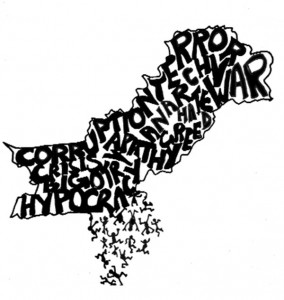
Sir,
This country is fighting war against terrorism but there seems to be no strategy to crush them with full force of state and restore the supremacy and writ of law to make Pakistan a country where, in the words of T Roosevelt, “Mo man is above the law and no man is below it, nor do we ask any man’s permission when we ask him to obey it.”
When two terrorists exploded pressure cooker bombs during the Boston Marathon on 15th April 2013 killing three and injuring 264 people, the entire Watertown county was shut down until the surviving criminal was hunted down on 19th April. For terrorism to be eliminated it requires tough laws and stringent measures, including temporary suspension of some fundamental rights. In the US, where freedom of expression, movement and carrying of arms are guaranteed by the constitution, they enacted the Patriot Act following 9/11. We have had several 9/11s, and thousands of citizens have been brutally killed, and yet vested interests which have reaped a bonanza from a criminal economy – where target killings, extortion and kidnapping for ransom has become almost an industry – are bent on obstructing the adoption of tough measures citing constitutional rights, which these very criminals have denied to citizens.
Pakistan’s sovereignty and survival depends on winning this war, and it is the constitutional obligation of the executive and all public office holders to protect the lives and property of all citizens. Every political party, religious group and individual is required to ensure the supremacy of the constitution and submit to the law, and this cannot be a subject of political negotiation. Nor is there a need for absolute consensus, since it has been established by the Supreme Court that specific political parties and religious groups are involved in violence and crime.
How could Maulana Abdul Aziz have the courage to publicly support the Tehrik-e-Taliban, a declared enemy of Pakistan, following the launch of Operation Zarb-e-Azb? Nobody, whoever he may be, is more important than the state of Pakistan, especially in times of war.
Tariq Ali
Lahore.

